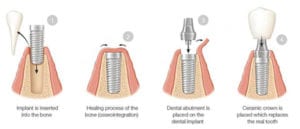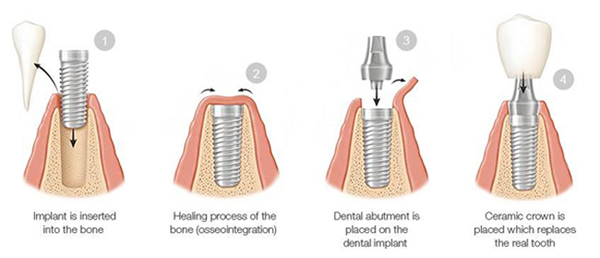Dental implants are highly effective in replacing missing teeth. But it takes time to get successful results. What should you expect as you recover?
1. Do’s and Don’ts
Do
- Take ibuprofen for pain three times a day for three to four days.
- Take anti-nausea or antibiotics as prescribed.
- Sleep with your head elevated for three to four days to minimize swelling and pain.
- Put gauze over the dental implant surgical site and apply pressure to minimize any bleeding. Report excessive bleeding that persists for longer than 30 minutes.
- Minimize swelling by applying ice (20 minutes on, 20 minutes off) to the side of your face near the surgical site.
- Eat soft, room temperature or cold foods.
- Begin gently rinsing your mouth with warm salt water the day after surgery. Rinse every two to three hours for the first three days. For the following two weeks, rinse after meals and at bedtime.
- Resume any prescription medications that you regularly take, unless otherwise directed by your doctor.
- Keep your follow-up appointments to monitor your implants, teeth, and gums.
Don’t
- Don’t exercise strenuously for the first few days after dental implant surgery.
- Avoid brushing or floss your teeth in the area of the surgical site.
- Avoid eating crunchy or chewy foods.
- Don’t drink alcohol for at least 72 hours after implant surgery. It restricts blood flow and inhibits healing.
- Don’t suck liquids through a straw. It increases bleeding and can dislodge the blood clot
- Avoid smoking because it restricts your blood flow and slows down the healing process.
- Don’t touch the surgical site or sutures.
2. Healing Time
Healing time includes implant surgery and bone grafting if needed.
Bone grafting
If you receive bone grafts, it will take 4 to 12months for the bone to heal and develop before you can receive dental implants. Adequate bone is needed to support implants and provide a successful outcome.
Implant surgery
It takes three to four months for your implant and jawbone to fuse. Meanwhile, you can wear a temporary crown.

Dental implant phases
3. Permanent Teeth
After your dental implant fuses to your jawbone, a permanent dental crown will be attached to the abutment, or connector, that is placed between the implant and crown. At times, prematurely loading an implant fixture with a crown can put too much stress on it and interfere with the healing process.
Each person’s biology is different, so don’t try to rush the healing process. Allow your dentist time to ensure healing is complete so you’ll have long-lasting implants that won’t fail and need to be redone.
Michael Szarek, DMD of Lowell, MA sponsors this post.

